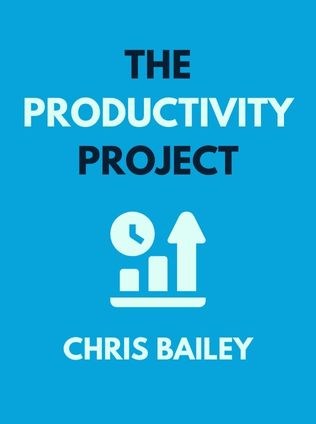
The Productivity Project
Accomplishing More by Managing Your Time, Attention, and Energy
By Chris Bailey
Published 01/2016
About the Author
Chris Bailey is a highly regarded expert in the realm of productivity, having spent over a year devoted to uncovering the secrets to becoming as productive as possible. After completing his business degree, instead of jumping into the workforce, Bailey decided to embark on a unique experiment—what he calls his "Year of Productivity." During this year, he meticulously researched, wrote about, and tested various productivity methods, all aimed at discovering what truly works when it comes to managing time, focus, and energy.
This deep dive into productivity wasn't just a theoretical exercise for Bailey; it was a personal journey. He became his own guinea pig, subjecting himself to rigorous routines, challenges, and experiments to see what strategies genuinely enhance productivity. The culmination of this journey is The Productivity Project, a book that distills the wisdom he gained during this year into actionable insights for anyone looking to make the most of their time.
Bailey's work has garnered significant attention, leading him to speak at major corporations like Google, Amazon, and Microsoft. His practical advice, grounded in both research and personal experience, has made him a sought-after voice in the world of productivity. Beyond The Productivity Project, Bailey has continued to explore the subject in other books, including Hyperfocus and How to Calm Your Mind, further cementing his reputation as a leading authority on the topic.
Main Idea
The Productivity Project is a comprehensive guide that challenges traditional notions of productivity. Instead of focusing on doing more, Chris Bailey redefines productivity as doing more of what truly matters. This book is not just about increasing efficiency or getting more tasks done; it’s about maximizing the impact of your efforts to free up time for the things that bring you the most joy and fulfillment.
The book is structured around 25 key strategies that Bailey believes can have the most significant impact on your productivity. These strategies are grouped into three main categories: time management, focus management, and energy management. Bailey offers practical advice on how to excel in each of these areas, drawing on both his own experiences and the insights of other productivity experts.
Table of Contents
- Introduction
- What Is Productivity?
- Get Clear on Your Why
- Prioritize Your Time
- Hone Your Focus
- Manage Your Energy
- Conclusion
What Is Productivity?
When most people think about productivity, they often equate it with being busy or getting a lot done. However, Bailey challenges this notion, offering a more nuanced definition of productivity. He argues that true productivity is not about doing more tasks; it's about doing more of the right tasks—those that align with your values and contribute significantly to your goals.
Bailey's perspective shifts the focus from quantity to quality. He suggests that productivity should ultimately serve the purpose of creating more time for meaningful activities, not just for the sake of doing more work. This approach is in line with the thoughts of other experts, like Stephen Covey, who emphasizes the importance of aligning daily actions with long-term goals. As Bailey notes, "Productivity isn't about doing more; it's about making more time for what really matters."
Get Clear on Your Why
Before diving into productivity strategies, Bailey stresses the importance of understanding why you want to be more productive. This "why" serves as a motivational anchor, keeping you focused and driven, especially during challenging times when staying productive feels difficult. Your reason for seeking productivity might be to spend more time with family, pursue a passion project, or simply reduce stress at work.
Bailey advises that to identify your "why," you should reflect on your core values and how they align with your long-term goals. By doing so, you can ensure that your productivity efforts are not just about getting more done but about getting the right things done. As Simon Sinek famously said, "People don’t buy what you do; they buy why you do it."
For example, if you value creativity, you might want to be more productive so that you can free up time to work on a personal art project. If family is your top priority, your reason might be to create more time to spend with your loved ones. Whatever your "why" is, Bailey emphasizes that it should be deeply personal and aligned with your core values, as this will make your productivity journey more meaningful and sustainable.
Sign up for FREE and get access to 1,400+ books summaries.
You May Also Like
The Subtle Art of Not Giving a F*ck
A Counterintuitive Approach to Living a Good Life
By Mark MansonRich Dad Poor Dad
What the Rich Teach Their Kids About Money - That the Poor and Middle Class Do Not!
By Robert T. KiyosakiHow To Win Friends and Influence People
The All-Time Classic Manual Of People Skills
By Dale CarnegieQuiet: The Power of Introverts
The Power of Introverts in a World That Can't Stop Talking
By Susan Cain



















